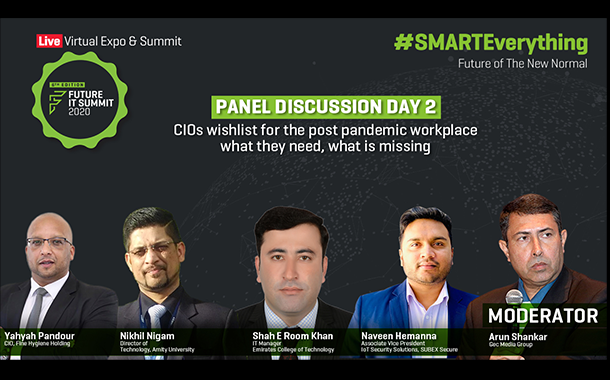The pandemic has accelerated change in every part of the real world and the digital world including the CIO ecosystem. Top CIOs at FITS 2020 look at fundamental questions including how has the post pandemic phase impacted the functioning of the CIO; what types of resources can benefit the CIO in the post pandemic phase; and should CIOs relook at their soft skills and position in the organisation.
Nikhil Kumar Nigam, Amity Education Group
Covid-19 pandemic has been a watershed event for the world in every aspect. CIOs need to drive creative new customer experiences, because in the new normal instead of face to face interactions, they will be driven towards the virtual world. Agility is essential to IT leadership as the pandemic illustrated how quickly a company’s outlook can change. As business priorities evolve, so must technology. CIOs must be able to act quickly and decisively in order to survive and stay relevant
CIO insight is critical to business strategy and they have to be the part of the new business continuity plan. Looking ahead, CIOs will see demand swell even as their budgets are compressed and they need to deliver high value at a low cost. Previously agreed upon plans may need to be reexamined, recalibrated, and adjusted to meet new demands.
New hybrid digital employee experience has to be introduced that not only brings in emerging technologies, but also brings in ease of work with better productivity with the help of automated operations, collaboration tools and mobility. New digital playbook and digital transformation plan is the key to success in the new normal. Business continuity plans need to be redesigned and reinforced. Emerging pandemic rules and regulations that are being laid down by the government need to be carefully worked upon.
Supporting IT employees right now is perhaps the most important job of all. Getting them the help, personal and professional, that they need to work through these times is paramount. Financial restructuring of IT will be required so the CIO’s need to look forward to make their presence in the board room and in discussions with top management. One should have empathy and place themselves in another’s shoes. We never know what the other person is coming through in the post pandemic situation.
Social skills, where the ability to build and manage relationships and influence others will be the key to network and success. CIOs need to engage in team building and networking that can generate healthy professional relationships that leads to better productivity. Emerging pandemic rules and regulations that are being laid down by the government need to be carefully worked upon.
Motivation is the drive that is internally generated rather than resting on external rewards or financial compensation or recognition that will be much needed. Dynamic and democratic leadership is one of the most effective leadership styles because it allows junior team members to exercise authority, they will need to use wisely in future positions they might hold.
Naveen Hemanna, Subex Secure
Virtual is the new real and CIOs have accelerated the digital transformation of their IT systems to cater to the demands from both internal and external stakeholders. Digital trust becomes a bedrock for all such initiatives and CIO’s are donning a new role of chief trust officers as they need to align their business and cybersecurity strategies to drive growth during these tiring times.
With the acceleration of digital transformation, there are now many more assets and endpoints connected to the Internet that increases the risk posture of an organisation. Hence, having a wholistic view of all the assets and their vulnerabilities becomes one of the key priorities of the CIO’s so they can redefine their security strategies and provide internal and external stakeholders a digitally secure environment to transact as well improve customer satisfaction and trust.
Employees have seen the biggest transition by adapting to work from home and for some it is a completely new way of working and interacting with fellow colleagues and customers. Hence, CIOs have to empathise their situation and engage with them via various platforms, so they feel connected and deliver value to the organisation.
Shah E Room Khan, Emirates College of Technology
We are in an era that many would call the post-pandemic, new normal. The COVID-19 pandemic has forced organisations across every industry to alter how they deliver products and services. Due to the current epidemic requirement have changed, and it is important to review all service level agreements. We should ensure that the agreement is in line with current requirements and future requirements.
The current economic conditions will add performance pressures on customers and vendors. It is a good time to renegotiate large contracts. If an organisation is facing negative cashflow conditions, we should negotiate with service provider for an additional year on current contract period. Now is the time to prepare for the 2021 trends in technologies.
The pandemic has reshaped technology priorities for 95% of companies. As a CIO we need to be on top of budgets, which are shrinking due to the current situation. As spending gets reduced, we must adopt new style of buying technology resources. Enterprises at this point are focusing on operational task and return on investment, but there has been an increase in spending on remote work and cloud adoption.
The sudden shift to remote work has accelerated digital transformation strategies to accommodate flexible ways of working and prompting IT leaders to consider downsizing physical infrastructure and transitioning to a cloud model. CIOs should have skills in transformation, team development, strategic thinking, transparency, and partnership capabilities to face the post pandemic challenges.
CIOs should be team-builders on an enterprise level to be effective leaders. Today’s successful CIOs stand out for other skills, including communication, building bridges between groups, and ability to understand and share the feelings of another.






















